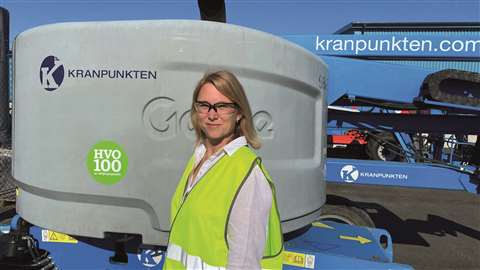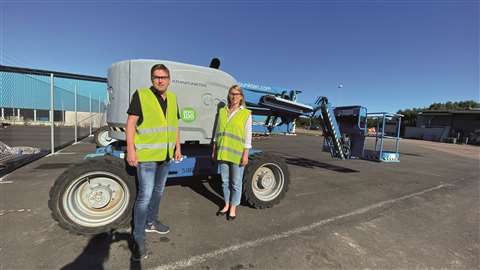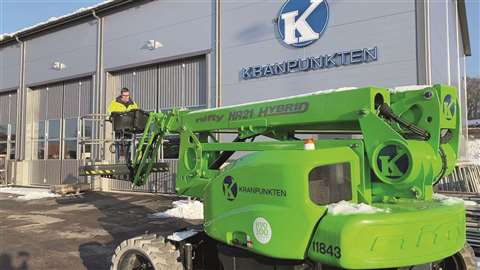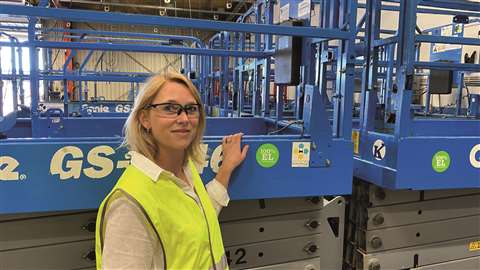How Kranpunkten is becoming 100% climate neutral
25 October 2021
Swedish rental company Kranpunkten is using measures including its ‘Function Pool’ to enhance efficiencies and achieve its aim of becoming 100% climate neutral, writes Belinda Smart.
 Sustainability manager Petra Lampa (pictured) says HVO100 comprises 80% of the fuel used to power Kranpunkten machines.
Sustainability manager Petra Lampa (pictured) says HVO100 comprises 80% of the fuel used to power Kranpunkten machines.
It is sometimes claimed that profitability and sustainability are two sides of the same coin. Good evidence of that is provided by Swedish company Kranpunkten, the specialist in aerial platforms, telehandlers and other lifting equipment, which is based in Förslöv, southern Sweden and serves Sweden and other Nordic markets through its eight depots.
Kranpunkten - with annual revenues of SEK 390 million (€38.5 million), 100 employees and 4000 machines in its fleet - has set itself ambitious and progressive sustainability goals for many years, and the policy has played a part in its solid performance.
According to sustainability manager Petra Lampa, since its establishment in 1989, it has achieved three decades of profitable growth, providing long-term stability and financial durability that, she says, makes it “highly equipped for the future.”
This resilience stood the company in good stead during the pandemic, allowing it to trade relatively unscathed as the Covid-19 took hold; it adapted its operations to the Swedish Public Health Agency’s recommendations as they evolved over time.
”The most important that have been with us from the beginning have been the necessity of keeping a social distance, good hygiene, restrictions on traveling as well as opening hours and a limited number of visitors to restaurants and events.
“Recommendations to work from home for those who can and to use mask in public transport have been in place for most of the period.”
“Based on this, we have been able to continue the business without affecting finances or practical obstacles in the operation.”
Business climate targets
Its resilience has also been built on its sustainability policies, which are regarded as a central plank of its commercial success.
It took the decision early in its history to aspire to a high standard of management, Lampa tells IRN, “involving certifications in quality, work environment, environment and creditworthiness...Our view is that sustainable value creation is a business prerequisite.”
Underscoring this ethos is a culture of continuous improvement, including measures to reduce emissions from machinery, vehicles and transport, phasing out of hazardous substances and reducing energy consumption and waste.
Alternative fuel sources have long been a focus for the Kranpunkten fleet; of the company’s 2020 machine investments, 84% were pure electric machines or hybrids. And since the beginning of 2021, Kranpunkten has been using the alternative fuel HVO100 for its machines where possible, a move it says reduces carbon dioxide emissions from relevant machines by up to 90%.
The company now uses HVO100 extensively; it comprises 80% of the fuel used to power its machines.
Lampa says the goal by the end of 2021 is to ensure that 80% of all transports that take place with the help of logistics partners should be carried out with alternative fuels in the tank.
“With new truck mounted platform lifts, we’re increasing the proportion of vehicles with emission class Euro 6 and receive the latest technology in internal combustion engines,” says Lampa. Waste reduction is another focus.
“With the long-term strategy and short-term operational plans, the aim is now for the business to become completely climate neutral.”
 urchasing manager Rikard Jönsson (left) says the fleet is renewed continuously with older machines disposed of.
urchasing manager Rikard Jönsson (left) says the fleet is renewed continuously with older machines disposed of.
Equipment fleet renewal
The company’s fleet disposal and renewal strategy are central to its sustainability goals, says Kranpunkten purchasing manager Rikard Jönsson.
“In order to maintain the quality of the machinery, but also to deliver the best machines environmentally, constant work is underway with the rental fleet,” Jönsson tells IRN.
“Older machines are disposed of on an ongoing basis. Our assessment is that reuse is more sustainable than sending the machines for scrapping directly.”
Of the 4000 machines in our fleet, 83% currently have electric power, either as a single power source or as a hybrid in combination with an engine. The remaining 17% of the machinery is being phased out and replaced with environmentally better machine types.
The company also works with its suppliers to achieve its sustainability goals; “We work closely with a few carefully selected machine suppliers who share our values and together we work to ensure that production takes place in the best possible way”, says Jönsson.
Equipment rental: What is the function pool system?
Underpinning Kranpunkten’s sustainability initiatives and operations is the ‘Function Pool’, an organisational system developed by the company in 2006, and a protected trademark since 2008.
The system works through the establishment of smaller depots with machines on large sutes, which enables rentals and machine servicing on site.
The development of Function Pool was prompted when the company identified a need for coordination of machine resources on larger projects, Lampa says. “We also saw the environmental benefits that, for example, fewer transports entail, as well as the increased level of service when we were able to provide customers with the machines or services they needed at very short notice.”
Over 2,500 of Kranpunkten’s machines are equipped with GPS, and in 2020 it also launched an app to enable servicing and maintenance at customers’ sites instead of transporting the machines back to depots.
Function Pool enables Kranpunkten to optimise transport by co-loading trucks where possible. “This work is ongoing every day in collaboration with our logistics partners and contributes to both environmental and economic benefits.”
The range of equipment and resources that can be provided under the Function Pool includes construction hoists and platforms; mini cranes and telescopic handlers; staff on site; training courses; loading and unloading areas; intermediate storage of incoming goods; and on-site waste management.
Other resources or functions include site toilets, lighting, containers, sheds, fencing, alarm systems, cleaning, snow removal, and logistics.
“With our resources, we can ensure that the customer always has the right machines in place and that the work runs more smoothly, while at the same time we can relieve the customer from coordinating logistics, service and support functions.
“In addition, it gives the customer’s project a good economy as rent is only charged per day each machine is used.”
Lampa describes Function Pool staff as “the spider in the web,” operating as a central hub, offering advice, ideas and service, freeing up time for customers to concentrate on construction planning and ensuring projects are on schedule.
“The Function Pool is customised according to each customer’s wishes, from minor renovation projects to very extensive new construction,”
 Kranpunkten’s goal is to reduce emissions and waste and ultimately become carbon neutral.
Kranpunkten’s goal is to reduce emissions and waste and ultimately become carbon neutral.
How Kranpunkten is optimising its resources
Despite procedures for servicing and maintaining machines, some hazardous waste is occasionally inevitable, in the form of oil spills and battery waste.
“Careful sorting of waste goes without saying for all our employees at all depots, while at the same time we work actively to reduce our waste,” Lampa says. “Our volumes of waste oil have decreased by 14% and our battery waste by 10% in recent years.”
All the electricity used by Kranpunkten comes from renewable sources such as solar, wind and hydro sources, and reducing energy consumption is another preoccupation, in terms of heating the premises and charging machinery at the company’s eight depots.
“Through new heating systems and additional insulation, we have over the last five years reduced the number of kWh consumed by 25%”, says Lampa, “The saving per year is about 250,000 KWh, which corresponds to approximately 10 normal-sized villas’ electricity consumption over a year.
“With solar cells, we produce electricity for our own consumption. Two of our depots today get their energy from the sun and we expect to be able to produce at least 30% of our consumption at these two depots ourselves. Our obvious goal is to continue installing solar cells at all depots that have the right conditions for it.”
Social initiatives: Working with communities
Kranpunkten views sustainability in a holistic light that also encompasses social welfare and involvement in local environmental projects and support for non-profit projects and charities within healthcare and research. The company also supports children’s and youth activities in sports clubs in the regions where it has a presence.
Closer to home however, one driver for Kranpunkten’s commitment to the welfare of its own employees is the skills shortage, Lampa says.
“Difficulties in recruiting employees/skills provision can ultimately pose a problem, not only for our industry, but for society as a whole. We are constantly working to offer the best possible work environment that attracts and develops employees.
“We work systematically to develop the work environment, promote the health of our employees and to prevent injuries and accidents at work. Our employees should feel safe and comfortable at work.”
Jönsson adds that where possible, the company works with local suppliers as well as engaging with customers; “We also place demands on customers and suppliers as they often have a significant role in the work environment.
“And the environmental performance of suppliers is a key evaluation that forms the basis for Kranpunkten’s choice of supplier.”
 Petra Lampa, sustainability manager at Kranpunkten
Petra Lampa, sustainability manager at Kranpunkten
How communication and cooperation help lower carbon emissions
This ongoing dialogue with its suppliers and logistics partners is regarded by the company as part of a cooperation that can drive Kranpunkten’s work to reduce its common CO2 emissions forward.
Customers’ feedback is continuously harnessed, adds Lampa. “Our customers’ environmental and business requirements become requirements for our machine suppliers.
“We know that profitability and sustainability go hand in hand, but we also know that the transition to a more sustainable business requires development, innovation and investment. At the same time, it also requires financial, material and human resources.”
“At Kranpunkten, we have a clear goal. We will take responsibility and make the transition required for a stable and sustainable business,” says Lampa. “A significant prerequisite for success in sustainability work is therefore long-term profitability and economic stability.”
Its consistent achievement of both looks set to position the company for a zero carbon future.
STAY CONNECTED



Receive the information you need when you need it through our world-leading magazines, newsletters and daily briefings.
CONNECT WITH THE TEAM







